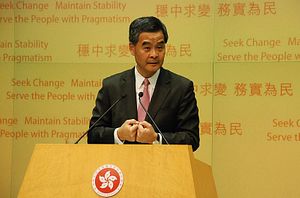If the Chinese government wanted to further ostracize an already marginalized Hong Kong population, then its recent election of Hong Kong’s incumbent and maligned chief executive CY Leung as an elder statesman should do the job.
Leung won overwhelming support from the mainland’s top political advisory body, Chinese People’s Political Consultative Conference (CPPCC), in his election as a vice chairman of the consultative body. 2066 CPPCC delegates voted in favor of a motion to appoint Leung, with 13 against and 16 abstaining. It is understood that the election is a sign of approval for the way he handled pro-independence advocacy and the Umbrella Movement protests of 2014.
“He was nominated as CPPCC vice chairman because of his contribution to Hong Kong, in particular his firm stance against the Occupy Central movement and putting it to an end. It was also because of his firm stance against pro-independence advocacy and cracking down on it,” CPPCC standing committee member Chan wing-kee said in Beijing.
The actual appointment will be put to vote by all CPPCC delegates on Monday, however, and some CPPCC delegates have expressed concern over the ongoing Independent Commission Against Corruption probe into a HK$50 million (US$6.4 million) deal between Leung and former Australian engineering firm UGL.
To further complicate the matter, if Leung is eventually voted in, he will be the first sitting chief executive to also play a dual role, and raises the question as to whether he would force the contravention of the “one country, two systems” principle. Article 22 of the Basic Law states that no mainland authority shall meddle in Hong Kong’s internal affairs.
Leading up to the vote, Hong Kong’s Democratic Party chairman Wu Chi-wai called Leung to resign from his post as Hong Kong chief executive if he was elected as a CPPCC vice chairman to avoid breaking the “one country, two systems” principle. In practice, this issue will likely be circumvented as the CPPCC is technically a “conference” comprising a number of parties, though the Communist Party of China (CPC) now holds one-third of the seats and overwhelming control. The other parties include CPC allies, with a handful of independent members who are allegedly aligned with no party.
The CPPCC holds a special place in Chinese government; it is a throwback to pre-Communist times, and originates from negotiations between the Kuomintang and the Communists in 1945. At the advent of the Communist control of China, the CPPCC served as a constitutional convention for the first government of China. The CPPCC has 21 vice-chairs, including ex-leaders from both Hong Kong and Macau.
Late last year, Leung announced that he would not run for chief executive again, citing family reasons; however, it was widely believed that Beijing had advised the unpopular leader not to put himself up for contention. His elevation to the CPPCC may suggest a deal was struck to reward Leung for carrying out the tasks assigned to him by the central government during his term in office.

































